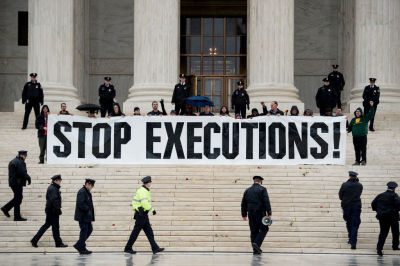Off with their heads! Or not

Were you as surprised as I was to learn that Russia doesn’t carry out capital punishment?
Technically, the death penalty is lawful in Russia, however, the government hasn’t performed any executions since 1996 when former President Boris Yeltsin established a moratorium, which was then explicitly confirmed by their Constitutional Court in 1999.
With the recent Islamic terrorist attack on a Russian concert hall that left 137 dead and nearly 200 wounded, some Russian government officials and citizens are calling for the return of capital punishment, but so far, the Kremlin has said it won’t entertain such action.
On the other side of the spectrum, you have Iran who hit an all-time high in executions for 2023. While the U.S. executed only 24 people last year, Iran hanged 834 people, with over half that number being carried out for drug-related charges.
It may not be as hot a topic as abortion, but temperatures can quickly rise in discussions among those who disagree on whether capital punishment is ethical or not. It’s always amused me a bit that, in general, those who favor abortion frown on the death penalty whereas many who are pro-life are OK with capital punishment. Seems like one side is OK with putting to death the innocent and not the guilty whereas the other side is the exact opposite.
In any event, the debate can get fierce in Christian circles too with both sides possessing the same Bible and arriving at different conclusions. So, is capital punishment OK or not? Let’s take a quick look at the main biblical theories on the death penalty and see what justifications their supporters use to defend them.
The death penalty throughout the Bible
The Old Testament has a few general verses that Christians will point to as their foundation for defending capital punishment. The first is, “Whoever sheds man’s blood, by man his blood shall be shed, for in the image of God He made man” (Gen. 9:6), followed up with “So you shall not pollute the land in which you are; for blood pollutes the land and no expiation can be made for the land for the blood that is shed on it, except by the blood of him who shed it” (Num. 35:33).
The nation of Israel had the death penalty along with an interesting and lengthy list (21 in total) of offenses that resulted in execution, although we don't know if or how many were actually carried out. It included acts you might expect like murder (Ex. 21:12), kidnapping (Ex. 21:16), and rape (Deut. 22:25) to moral offenses like adultery (Lev. 20:10) and lying in a capital crime (Deut. 19:16-19), to more spiritual sins like idolatry (Ex. 22:20), blasphemy (Lev. 24:15-16), witchcraft/sorcery (Ex. 22:18), being a false prophet (Deut. 18:20), and sabbath breaking (Ex. 31:14). There were also some eyebrow-raising ones thrown in like cursing your parents or rebelling against them (Deut. 5:16, Ex. 21:15, 17).
I won’t go into the debate over how or why those transgressions resulted in a death penalty sentence but am only pointing out for now that capital punishment was carried out during Old Testament times.
In the New Testament, the two most cited verses for supporting the death penalty come from Paul. When he was on trial, Paul alluded to capital punishment when he said: “If then, I am a wrongdoer and have committed anything worthy of death, I do not refuse to die” (Acts 25:11).
His most famous statement on the subject, though, is found in Romans: “For rulers are not a cause of fear for good behavior, but for evil. Do you want to have no fear of authority? Do what is good and you will have praise from the same; for it is a minister of God to you for good. But if you do what is evil, be afraid; for it does not bear the sword for nothing; for it is a minister of God, an avenger who brings wrath on the one who practices evil” (Rom. 13:3–4).
All that said, if you do a survey of general thought on the biblical view of the death penalty, you find 3 theories: 1. reconstructionism (execution is possible for all major crimes, 2. rehabilitationism (not for any crime), and 3. retributionism (allowed for some capital crimes).
Supporters of reconstructionism believe that the law should reflect God’s unchanging character, and since Jesus said He did not come to abolish the Law, we find capital punishment being affirmed in the New Testament.
Detractors of reconstructionism decry the approach with one reason being capital punishment is a penalty for breaking a law and not a law itself, i.e., there is a distinction between whether an act is wrong (a law) and the historical penalty for it. For example, Paul did not call for capital punishment for an adulterer but instead recommended excommunication (1 Cor. 5:5).
Defenders of rehabilitationism argue that justice is remedial, not retributive, and that the criminal should be reformed, not punished (at least capitally). They highlight the fact that Cain was not put to death for killing Abel, David was not given the death penalty for adultery and murder, and the adulterous woman highlighted in John 8 was not condemned to death by Jesus. The concept of forgiveness also plays a big part in this view.
Opponents of rehabilitationism argue that the primary purpose of justice is not rehabilitation, but punishment with rehabilitation being secondary. Further, they say that the concept of New Testament forgiveness is a personal and not a state matter.
Last on the list is retributionism whose advocates argue that the death penalty should be allowed for certain crimes, primarily murder, because human beings are made in the image of God and reflect God here on earth. It holds that the primary purpose of justice is to punish the wrongdoer with the punishment being in force before the Mosaic Law was given. Capital punishment is handed down to the government, which God ordained to carry out the sentence, and not to individuals (Rom. 13:4).
Those opposed to retributionism primarily argue that the Ten Commandments say “do not kill” (which is incorrect – it says do not “murder”, with the Hebrew word indicating a distinction between justified killing and murdering), that innocent people have been executed in the past for crimes they didn’t commit, and that we’re told to turn the other cheek (Matt. 5:39; really an act of insulting a person vs. a life-threatening action).
So, which, if any, biblical theory on capital punishment is correct?
I’ll say I fall squarely into the retributionism camp and that it’s the theory that makes the most practical and biblical sense to me. But maybe you feel differently? If so, that’s why there’s a comment section to these articles so let me know what you think.
Robin Schumacher is an accomplished software executive and Christian apologist who has written many articles, authored and contributed to several Christian books, appeared on nationally syndicated radio programs, and presented at apologetic events. He holds a BS in Business, Master's in Christian apologetics and a Ph.D. in New Testament. His latest book is, A Confident Faith: Winning people to Christ with the apologetics of the Apostle Paul.




























